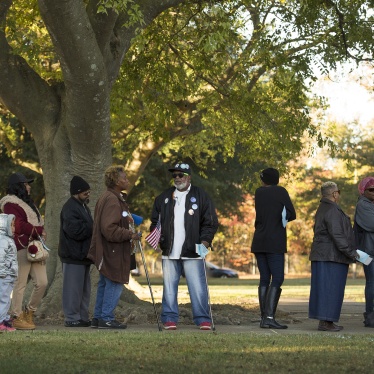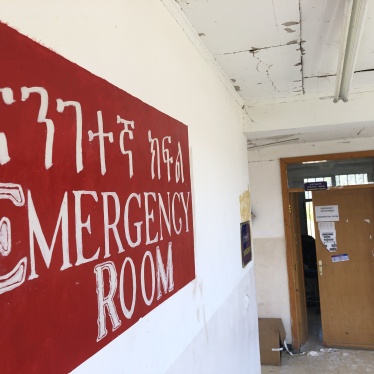Human Rights Watch joined religious, legal, and civil rights organizations to oppose the provisions in H.R. 1279, the Gang Deterrence and Community Protection Act of 2005, which would expand the federal death penalty. At a moment when the nation is increasingly concerned with the fairness and reliability of the death penalty, it would be unwise for Congress to extend capital punishment in any form.
The Honorable Howard Coble
Chair, Judiciary Committee
Crime, Terrorism, and Homeland Security Subcommittee
House of Representatives
Washington, DC 20515
The Honorable Robert C. Scott
Ranking Member, Judiciary Committee
Crime, Terrorism, and Homeland Security Subcommittee
House of Representatives
Washington, DC 20515
Re: H.R. 1279, The Gang Deterrence and Community Protection Act of 2005.
Dear Representatives Coble and Scott:
The undersigned organizations write to oppose the capital sentencing provisions in the Gang Deterrence and Community Protection Act of 2005 (H.R. 1279), which is scheduled for a hearing and markup on April 5. This bill would unwisely create several new death-eligible offenses and increase the penalty for some existing crimes to death, at a time of growing concern regarding the fairness and reliability of our nation’s capital punishment system. Further, it grossly expands venue in capital cases so that crimes need not be prosecuted in the jurisdiction where they occurred, raising troubling questions of whether accused persons would have a fair trial by a jury of his or her peers.
The increasing numbers of innocent people released from death row illustrates the fallibility of this system. Last year, a University of Michigan study identified 199 murder exonerations since 1989, 73 of them in capital cases. The same study found that death row inmates represent a quarter of 1 percent of the prison population but 22 percent of the exonerated. Since 1973, 119 innocent people have been released from death row.
The death penalty is also racially and economically discriminatory. After its careful study of the death penalty in the United States, the United Nations’ Human Rights Commission in 1998 issued a report which rightly concludes: “Race, ethnic origin and economic status appear to be key determinants of who will, and who will not, receive a sentence of death.” These problems are not confined to state systems; a recent Department of Justice survey documents racial, ethnic and geographic disparity in the charging of federal capital cases. Indeed, the review found that in 75 percent of the cases in which a federal prosecutor sought the death penalty, the defendant was a member of a minority group. The explanation for these extremely troubling disparities is unclear, but the possibility of discrimination and bias cannot be ruled out.
We are also concerned that, in creating new federal death-eligible offenses out of traditional state crimes, the law will flout evolving community standards regarding the appropriateness of the death penalty for certain offenses. In contrast to the trend in many states, federal prosecutors appear to be seeking the death penalty more often than they did in the past.
The expansive language of H.R. 1279 will only exacerbate these problems. This bill is so broadly drawn as to create death-eligible offenses in a wide range of crimes in which death occurs. This runs counter to Supreme Court jurisprudence that requires death penalty statutes to be narrowly drawn so that only the “worst of the worst” offenders are sentenced to death.
H.R. 1279 also expands venue in capital cases, making any location even tangentially related to the crime a possible site for the trial. This change in law will increase the inequities that already exist in the federal death penalty system, giving prosecutors tremendous discretion to “forum shop” for the most death-friendly jurisdiction in which to try their case. The ability of federal prosecutors to choose their venue, across a wide range of possible states and jurisdictions, will lead to an increase in the racial and geographic disparities already at play in the federal death penalty system.
For these reasons, we urge you to amend H.R. 1279 to eliminate the federal death-eligible offenses and to eliminate Section 110 that expands venue in capital cases. Thank you very much for your attention to this important matter.
Respectfully Submitted,
Laura W. Murphy
Director
American Civil Liberties Union Washington Legislative Office
Tonya McClary
Director of the Criminal Justice Program
American Friends Service Committee
Alexandra Arriaga
Director of Governmental Relations
Amnesty International USA
Rabbi Marla Feldman
Director
Commission on Social Action of Reform Judaism
Mike Farrell
President
Death Penalty Focus
Shari Silberstein
Co-Director
Equal Justice USA/Quixote Center
Jamie Fellner, Esq.
Director, U.S. Program
Human Rights Watch
Wade Henderson
Executive Director
Leadership Conference on Civil Rights
Renny Cushing
Executive Director
Murder Victims’ Families for Human Rights
Hilary Shelton
Director
NAACP Washington Bureau
Barry C. Scheck
President
National Association of Criminal Defense Lawyers
Diann Rust-Tierney
Executive Director
National Coalition to Abolish the Death Penalty
Jenni Gainsborough
Director, Washington Office
Penal Reform International
Steve Hall
Director
StandDown Texas Project




